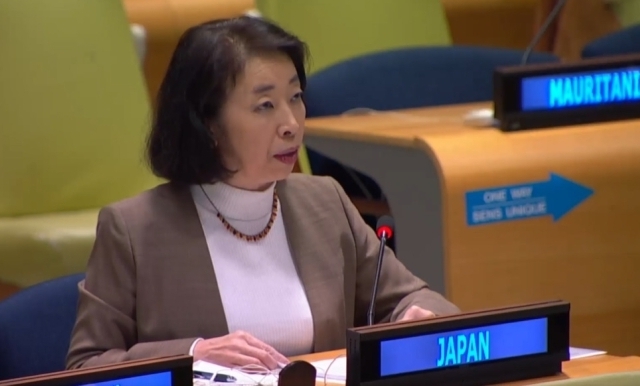安保理改革に関する政府間交渉(IGN)における志野大使ステートメント
令和6年3月18日

(Check against delivery)
Co-Chairs,
Japan aligns with the statement made by Germany on behalf of the G4. Let me add some points in my national capacity.
We welcome our UfC colleagues’ contribution to this constructive discussion by presenting their model. I am glad to note that we see some convergences. For example, Japan supports the idea of: a) limiting the use of the veto under certain circumstances; and b) enhancing the transparency, efficiency, and effectiveness of the Council through improving its working methods. We are very much looking forward to a fruitful discussion tomorrow on the working methods, in particular.
On the other hand, there remain several critical points which require further clarification:
First, the number of newly elected seats. The UfC proposes “up to” a maximum of 12 additional seats. We would like to clarify what “up to” means – can it be 10, 8, 6, or even zero? Since we are aiming for equitable geographical representation, the number of seats is an essential piece of information.
Second, elements regarding the longer-term seats. The UfC says that they are “open and flexible” to the length of term, the number of long-term seats, conditions for immediate re-election, and maximum duration of continuous service. We welcome the openness and flexibility of the UfC, at the same time, we would like their model proposal to be more concrete on this issue so that we can compare our models and discuss convergences and divergences between them in detail.
Once again, let me renew my gratitude to our UfC colleagues, and the Co-Chairs, for this thought-provoking opportunity. It is good to reaffirm that the UfC recognizes the need for reform, as we do. We look forward to further discussion, which will deepen our mutual understanding of each others’ positions.
Thank you.
Japan aligns with the statement made by Germany on behalf of the G4. Let me add some points in my national capacity.
We welcome our UfC colleagues’ contribution to this constructive discussion by presenting their model. I am glad to note that we see some convergences. For example, Japan supports the idea of: a) limiting the use of the veto under certain circumstances; and b) enhancing the transparency, efficiency, and effectiveness of the Council through improving its working methods. We are very much looking forward to a fruitful discussion tomorrow on the working methods, in particular.
On the other hand, there remain several critical points which require further clarification:
First, the number of newly elected seats. The UfC proposes “up to” a maximum of 12 additional seats. We would like to clarify what “up to” means – can it be 10, 8, 6, or even zero? Since we are aiming for equitable geographical representation, the number of seats is an essential piece of information.
Second, elements regarding the longer-term seats. The UfC says that they are “open and flexible” to the length of term, the number of long-term seats, conditions for immediate re-election, and maximum duration of continuous service. We welcome the openness and flexibility of the UfC, at the same time, we would like their model proposal to be more concrete on this issue so that we can compare our models and discuss convergences and divergences between them in detail.
Once again, let me renew my gratitude to our UfC colleagues, and the Co-Chairs, for this thought-provoking opportunity. It is good to reaffirm that the UfC recognizes the need for reform, as we do. We look forward to further discussion, which will deepen our mutual understanding of each others’ positions.
Thank you.
